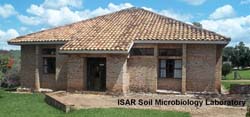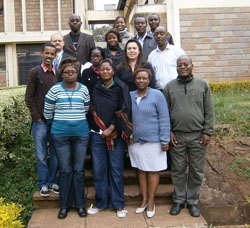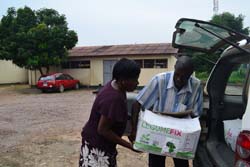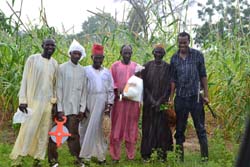| Introduction |
This issue of the Podcaster is devoted to N2Africa’s work in rhizobiology and rhizobial inoculants. While a general lack of technical and scientific capacity in soil microbiology and rhizobiology remains a general concern across the project, you can read about the ongoing initiatives to upgrade facilities and train staff, on actions to procure high quality inoculants and make them available to smallholder farmers, and to work on regulations to ensure that inoculants can be moved readily between countries. Some updates on ongoing research are also presented. Many thanks to Abdullahi Bala for coordinating this thematic issue of the Podcaster!
|
1 |
| N2Africa enhancing laboratory capacity in Africa |
|
Laboratory and greenhouse facilities in African countries are undergoing upgrade and complete makeover – thanks to the substantial investment in state-of-the-art facilities being made by N2Africa to enhance the capacity of NARS to carry out research in rhizobiology and general soil microbiology. More details in the full new item. |
 |
|
2 |
| N2AFRICA Rhizobiology Activities at ISAR, Rwanda: June 2011 |
 |
The ISAR Microbiology Laboratory leads N2Africa rhizobiology activities in Rwanda and liaises with related actions in DR Congo and Rwanda. |
|
3 |
| Legume Inoculant Technology and Quality Control Procedures Workshop |
|
A workshop on Legume Inoculant Technology and Quality Control (QC) procedures was held at the Microbial Resources Centre Laboratory (MIRCEN) in the Department of Land Resource Management and Agricultural Technology (L.A.R.M.A.T.), University of Nairobi (UoN; Kabete Campus) from July 4th to 22nd, 2011. The training was co-funded by the N2Africa Project and SIMLESA (Sustainable Intensification of Maize-Legume Cropping Systems for Food Security in Eastern and Southern Africa) with the focus to provide participants with the latest ideas and techniques in manufacturing Rhizobium inoculants and in QC testing procedures required in achieving high quality legume inoculants. |
 |
|
4 |
| Emerging challenges in cross-border movement of inoculants in sub-Saharan Africa |
Since the late 19th century, root nodulating rhizobia (RNB), commonly known as rhizobia, have been known to be responsible for fixing atmospheric nitrogen on legumes. This knowledge led to the use of inoculants. Challenges for N2Africa how to import inoculants timely in the different countries in the project are described.
|
5 |
| N2Africa consultant visits the inoculant factory at Marondera, Zimbabwe |
Dr Bruce Knight of the legume Technology, UK, was in Zimbabwe on 26th June-2nd July 2011 to work with staff of the inoculant production plant at the Soil Productivity and Research Laboratory (SPRL), Marondera. Legume Technology Ltd is the producer of LegumeFix inoculants for various legume crops and Bruce was engaged by N2Africa as a consultant for his tremendous experience in the inoculant manufacturing industry. His task was to familiarise himself with the technical aspect of production and recommend changes in production process, equipment and other resources that will result in a more efficient and cost-effective process of production and a high quality product.
|
6 |
| N2Africa goes global in search for high quality inoculants |
 |
The N2Africa project sent out invitation to global inoculant manufacturers to tender for the supply of soyabean inoculants for the project’s research and development activities in 2011 and to consider establishing partnerships with local agro-dealers in all 8 N2Africa countries. This was done to ensure, that the project provides smallholder farmers with the best quality inoculants available.
On the photo: N2Africa’s Farm Liaison Officer for Nigeria, Esther Chinedu, off-loads boxes of LegumeFix soyabean inoculants received from Legume Technology Ltd, UK.
|
|
6 |
| Inoculation and fertilizer blending affects nodulation of climbing bean and soyabean in Kenya |
An assessment of legume root nodulation by two grain legumes in response to inoculation and fertilizer source suggests that nodulation number, frequency of crown nodulation and the effectiveness of symbiosis may be controlled by crop management. Two grain legumes, climbing bean “Kenya Tamu” and soyabean SB19 were established at twelve locations in west Kenya. They were planted using different fertilizer and inocluation treatments and nodule production was scored after eight weeks.
|
6 |
| Samson Foli on working visit to Nigeria |
|
Samson Foli, an MSc student of Wageningen University, The Netherlands, will conduct nutrient omission trials in greenhouse and field experiments to try to unravel the cause of non-responsiveness of soyabean to fertilisation especially of phosphorus.
On the photo: Samson Foli (extreme right) poses for a photograph with farmers in one of the communities where he is carrying out detailed farm characterisation
|
 |
|
6 |
| Sharing highlights from the revised Agricultural Development strategy of the Bill& Melinda Gates Foundation |
Here we share the revised Agricultural Development Strategy recently sent to N2Africa.
|
8 |
| The value of Inoculants |
Click here for a useful document from the USA on the use of rhizobial inoculants.
|
9 |
| Soyabean best practices checklist in English and Swahili |
Click here for checklists in English and Swahili on “Best practices to maintain high yield and grain quality of soyabean”.
|
10 |






